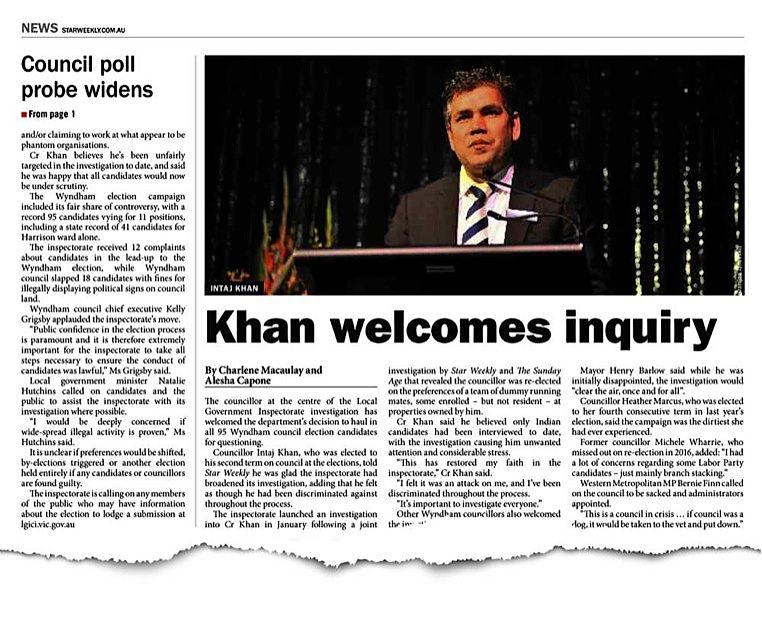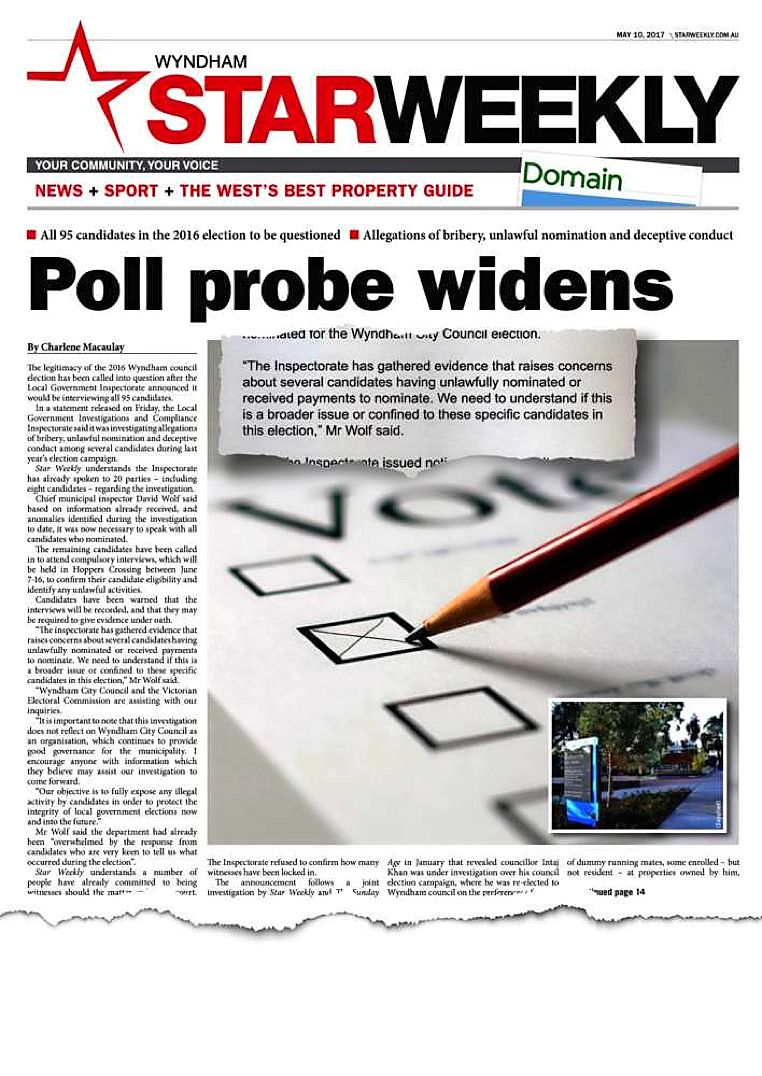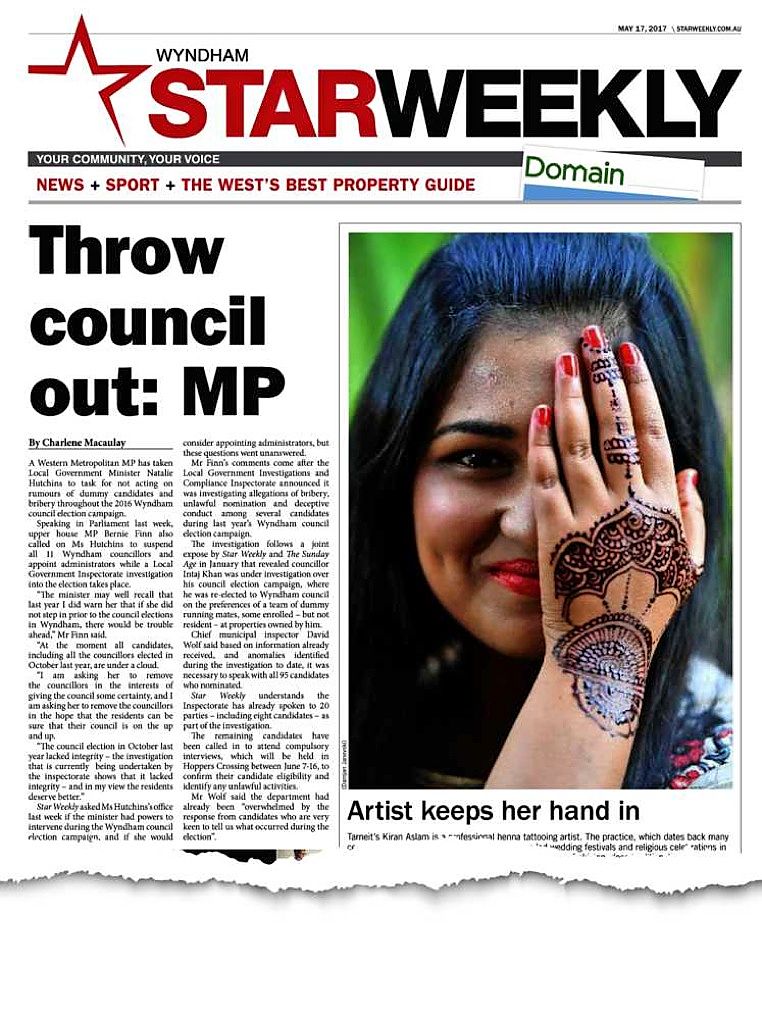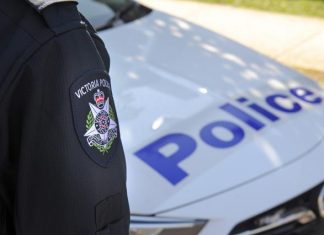Meet the man in charge of the investigation into the 2016 Wyndham council election.
Earlier this month, chief municipal inspector David Wolf announced the Local Government Investigations and Compliance Inspectorate would be interviewing all 95 candidates over allegations of bribery, unlawful nomination and deceptive conduct during last year’s election campaign.
Charlene Macaulay sat down with Mr Wolf to find out more.
What prompted the investigation?
In the course of the election period we had a number of issues brought to our attention … not just complaints, but a number of inquiries or questions or intelligence that was raised with us about the Wyndham council.
One of the most stark issues for us was the number of candidates for the municipality. If you compare it to across the state, there was a general ratio of about four candidates per vacancy, and in Wyndham it was more like 10 candidates. That stood out to us as being an anomaly. Based on that, with all the intelligence and inquiries and informal complaints, sparked our interest.
Why has the Inspectorate deemed it necessary to interview all 95 candidates?
The investigation is well advanced in terms of a number of issues, and in the course of those investigations, additional items continued to arise or be raised with us. We felt it was important to speak with all candidates and get a full picture of what had occurred, and that’s to do two things: to see if the issues are more widespread, and also to exculpate or clear the genuine candidates that stood.
It’s very important that the genuine candidates are acknowledged for that and aren’t discouraged for either standing for office in the future, or if they are in office, for remaining in office.
Are there any current councillors that have already been cleared through this investigation?
In terms of individual circumstances, that’s one thing I can’t comment on just yet, that would be unfair to a whole range of people. What I can say is, we will deal with individuals. The focus of the investigation is some of the individual behaviour, but also to try and see if we can confirm some of the gaps in the overall system and have those addressed for the 2020 elections and any other elections in between.
What gaps are you referring to?
Where there’s opportunity for people to nominate unlawfully, perhaps the ease for that to happen, and some of the issues around people that have found themselves in this process and weren’t fully aware that they were part of the process.
You’ve invited people to come forward with information regarding the election. How many people have come forward, and what kind of information have you received to date?
We’re really pleased with the response from candidates, which says to me that there’s many genuine candidates who want to clear their own name, but also provide information about what they saw in the election period, so that’s very encouraging.
We’ve had a limited response from the community … we heard quite a bit of information that could be called rumours and what we would like to do is confirm those rumours, and we can only do that if people come forward and tell us what they know.
Apart from the interviews, what else is involved in this investigation?
There is a great deal of forensic work we do around documentation and process, and match that against what witnesses tell us, and information they provide us. When you think of it, it is a bit like a jigsaw puzzle – this one has a lot of pieces, given the number of candidates. We have a pretty clear picture already, but we want the full picture.
It is a very interesting investigation, and our ultimate objective is to tighten the system up, improve the system. From our perspective, it is so important that the front-end process – the nomination and election process – for councils is as robust and strong as possible, because that then reflects on the next four years of a council term. If we get that right, that will improve the system for everybody across the state.
The interviews will be taking place next month. Have you locked in interviews with all of the candidates you’ve sent out letters to?
It’s still underway, the majority are scheduled in. Two-thirds of the candidates have made arrangements to meet with our investigators. We are yet to have a response from every candidate and will be following up anyone who has not replied.
Are there penalties for people that don’t participate?
Yes. We’re exercising our powers to require people to come in to be interviewed. If we have someone who refuses, we have the capability to take that person before the court to certify a failure. We’ll look at all the circumstances around that person and decide whether the public interest warrants us doing that. So, if there is a really important piece of the jigsaw puzzle that we need filled in, and that person’s part of that, then we’ll look at that option.
Many believe that the investigation centres around candidates in Harrison ward – is this true?
It started with Harrison ward, absolutely. But the proportion of candidates across the whole municipality has guided us to broaden the scope to look at all wards, and we think that’s fair for the municipality to have a complete picture.
In particular, there’s been media reports about the actions of councillor Intaj Khan – does the investigation focus specifically on his actions, and the ripple effect from them?
That’s again one of the questions that I unfortunately can’t answer at this point. That will become broader public knowledge as the investigation unfolds.
What’s the timeline for the investigation? When can residents expect the findings to be released?
We’ve developed a pretty clear picture for us now, once the interviews are completed there will be some time to consolidate the information … but some elements of it will progress quite quickly after that.
How many people are working on the investigation?
At the moment, almost all my office is working on it, there’s eight staff.
What could the implications be for the result of last year’s election if a candidate is found guilty?
We don’t draw conclusions about the overall integrity of the election. From our perspective, the conduct of the election is not in question, it is the actions of candidates … that we’re looking at, and that comes with individual liability. If they’ve committed offences, then those individuals will be responsible.
Regarding the offences, are we talking criminal charges?
Yes. Under the Local Government Act, there’s a range of criminal charges – the most serious being bribery, which is offering inducements for people to undertake certain actions. But also, offences for unlawfully nominating, where you don’t have an entitlement, or you make a fictitious entitlement to nominate in this municipality.
Is there anything else you wanted to mention regarding the investigation?
This does not relate to the Wyndham City Council, so the operation of council is still achieving what we would expect from a state perspective. It’s still operating very successfully, delivering a lot of core services.
The Inspectorate is still seeking information from the public to assist with this investigation.
Click here to lodge a submission.










